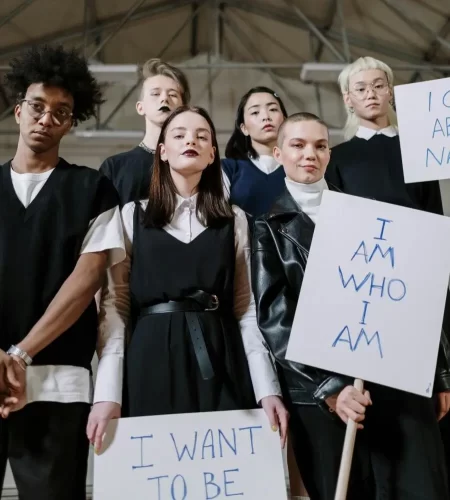How to Advocate for Acceptance During April's Month of Autism Awareness
 Imagine a world where neurodiversity is celebrated, and where differences are embraced rather than shunned. This is the vision of the autism acceptance movement. It challenges us to move beyond mere awareness and into a realm where we actively strive to create a society that accommodates and appreciates individuals with autism.
Imagine a world where neurodiversity is celebrated, and where differences are embraced rather than shunned. This is the vision of the autism acceptance movement. It challenges us to move beyond mere awareness and into a realm where we actively strive to create a society that accommodates and appreciates individuals with autism.
The month of autism awareness and acceptance explains the importance of shifting from mere awareness to genuine autism acceptance, delving into how this shift can positively impact the lives of those on the spectrum and contribute to a more compassionate and inclusive society for all.
While not everyone is aware of April being designated as a month of autism awareness and acceptance, the impact of events held throughout the month has gone a long way toward making autism spectrum disorder a recognized neurological difference.
Events, which may occur during World Autism Awareness Day on April 2, during the first week of April, or throughout the month, seek to promote understanding, inclusion, and acceptance of people with autism spectrum disorder.
Autism acceptance emphasizes appreciating neurological diversity, rejecting stereotypes, and supporting the right of those with autism to live fully as themselves in society. This year’s theme, “Advancing Neurodiversity,” encourages us to move beyond tolerance to genuinely recognizing the unique gifts and talents those with autism bring to our communities.
READ MORE: Autism on the Brain – Unpacking the Meaning Behind Neurodiversity
What is Autism Acceptance?
Autism affects millions of individuals worldwide, yet it remains one of the most misunderstood and stigmatized conditions in society. Despite increased awareness efforts, misconceptions about autism continue to persist, leading to discrimination and isolation for those on the spectrum.
However, as understanding grows, a new movement is emerging – one that seeks not only to raise awareness but also to foster autism acceptance and inclusivity for individuals on the spectrum.
Autism acceptance is the viewpoint that autism is a natural facet of human diversity that should be valued. This means accepting autistic people as they are, without trying to change them or make them conform. The autism acceptance movement pushes back against the notion that autism is only a disability or disorder to be cured or fixed. Instead, it takes the approach that people on the spectrum have as much right to exist in society as neurotypical individuals.
This contrasts with autism awareness, which tends to portray autism in need of solutions or as a burden on families and education systems. In contrast, autism acceptance focuses on accommodations, civil rights, and appreciating the neurodiversity those with autism provide. Acceptance seeks equal opportunities for those with autism to make their contributions known without masks or mimicking neurotypical behavior.
Month of Autism Awareness and Why Autism Acceptance Matters

This leads to exclusion, discrimination, and lack of support services. Promoting autism acceptance thus works to increase the quality of life for those on the spectrum.
Additionally, autistic minds are responsible for many innovations and creative accomplishments that have made the world better. As Steve Silberman writes in NeuroTribes, many eminent scientists and innovators exhibited autistic traits. By accepting neurological differences, the unique perspectives of those on the spectrum can continue making groundbreaking discoveries that propel humanity forward.
There are also likely countless untapped talents on the spectrum who struggle to contribute their gifts due to a lack of self-esteem or societal barriers against disabled individuals succeeding. By transforming attitudes to acceptance, more opportunities can open for diverse minds to uplift our communities.
READ MORE: Spotlight on the Spectrum – Understanding the 3 Levels of Autism
Ways to Promote Acceptance During Month of Autism Awareness and Every Day
If any of the above resonates, there are numerous ways to help spread autism acceptance now and throughout the year:
Learn About Autistic Experiences
Books: The best way to grow in understanding is exposure to a diversity of life stories from those on the spectrum recounting their journeys. Some stellar examples are Thinking In Pictures by Temple Grandin, In a Different Key by John Donovan, and Autistics’ Guide to Dating by Emilia Murry Ramey.
Hashtags: Social media has created spaces for autistic voices to be heard on their own terms. Hop over to Twitter or Instagram to find #MyAutismMind #AutisticJoy, #RedInstead, and #AskingAutistics to gain perspective.
Videos: The Autism Society and Autistic Self Advocacy Network have excellent series and talks online to check out. Hearing autistic challenges and triumphs directly from individuals is incredibly insightful. As an autistic myself, I regularly publish video shorts and provide personal insights on TikTok and Pinterest that I hope you’ll find meaningful.
Support Inclusion and Acceptance
At work/school: Encourage administrations or managers at your workplace or school to implement inclusion policies like allowing accommodations for autistic employees or students. Sensory-friendly workspaces make integration far more achievable.
Events: Look into special autism acceptance activities hosted in your local community this April. Events like meet-and-greets provide supportive space for those with autism.
Entertainment: Support television shows, films or media that display good representation of autistic characters. Well-rounded autistic characters also reduce stereotyping.
Appreciate Autism’s Value as Part of Month of Autism Awareness
No two people on the spectrum exhibit precisely identical qualities. Because autism characteristics occur across a broad continuum, autistic people may excel at anything from sports to spelling to music and beyond. Make an effort this month to compliment unique skills that set those with autism you know apart rather than just tolerating differences.
Saying something as simple as “I admire how you remember complex concepts” or “Your intense focus is inspiring and yields phenomenal results” can make their day. Recognizing strengths combats frequent self-criticism those on the spectrum often undertake when comparing themselves unfairly to neurotypical standards.
You also stand to gain fresh wisdom from the varied perspectives autistic friends offer by thinking divergently about the world in unexpected ways aligned with their passions. Value that gift rather than allow it to intimidate you if it does not align with your mode of processing.
Overcoming Barriers to Acceptance
While the autism acceptance movement has made significant strides, barriers still remain that limit full inclusion for those on the spectrum. By being aware of key obstacles, we can work to address them through continued advocacy and policy improvements.
Accessibility Issues Remain An Issue With Autistics
Many public spaces like schools, workplaces, and community areas still do not adequately accommodate sensory processing differences. Fluorescent lighting, loud sounds, strong scents, and lack of calming spaces create challenging environments for those with autism to navigate comfortably while completing daily tasks.
Providing quiet rooms, noise-canceling headphones, or allowing flexible working arrangements are simple but high-impact accommodations. These modifications empower those on the spectrum to participate to their full potential with less risk of sensory overload.
Social Exclusion Continues To Be A Major Hurdle for Individuals with Autism
Navigating the intricacies of social relationships can be confusing for those with autism. Without proper understanding from peers, autistic children and adults often find themselves ridiculed or excluded rather than accepted.
We must encourage compassion and support in classroom and work settings as well as friendship circles and continuously remind ourselves not to judge those who communicate or behave unconventionally. Meetups that connect autistic and neurodiverse individuals can also ease loneliness through mutual understanding.
Unequal Job Opportunities
The unemployment rate for autistic adults remains up to 85% higher than average, even for those with college degrees. This represents huge untapped potential within the autistic community.
It also points to discrimination in hiring processes not designed to evaluate the unique capabilities of those on the spectrum. Adjusting assessments to be more inclusive would benefit both employers and autistic applicants. Some companies have piloted special autistic training and hiring initiatives with great success.
However, there is much more to do in this area, as lip service and pretty marketing photos of happy diverse employees rather than real change continues to be a challenge. Major companies need to heed the call to recognize strengths in everyone and allow neurodivergents to show of their true gifted selves.
By remaining aware and patient when overcoming remaining barriers, we continue the gradual cultural shift toward autism acceptance. Each act of understanding gets us closer to a society where those with autism can fully participate while being appreciated for the special talents they offer.
READ MORE: What Employers Should Know About Neurodiversity
The Future of Autism Acceptance

As new generations grow up with more exposure to those with autism in schools and the portrayal of autistic characters in media, prejudice diminishes. We are progressing towards all different types of neurodivergence being recognized as equal and vital components of our shared humanity.
But getting to full acceptance requires continued effort by all to shift remaining misconceptions of autism as something scary or undesirable. Autism Acceptance Month represents the perfect opportunity to move this cultural change forward by taking small steps to open our communities.
When those with autism truly feel heard, respected, and supported rather than pressured to conform at a cost to personal well-being, we unlock incredible potential.
Strength arises from harmony between all elements of society, not elimination of diversity. By learning to celebrate glorious autistic minds, we all lift each other higher.
READ MORE: How to Champion Disability Rights in Politics
Autism Acceptance Creates Positive Change
While awareness of autism as an aspect of diversity has grown over the decades, full societal acceptance remains an ongoing process. But by continuing advocacy for neurological differences as equally contributing components of humanity, increased inclusion follows.
The good news as we enter another April embracing autism is that each small effort makes a difference. Whether working to extend civil rights, holding events to facilitate integration, or simply complimenting an autistic person’s abilities, it all coalesces to transform attitudes. Change starts small before growing into a genuine celebration of glorious minds that think wonderfully differently. Let’s strive to get there together!
Symbols of World Autism Month
There are different ways individuals show support for autism. In addition to the many walks, fundraising efforts, and campaigns, people also show their support through symbols. I do have to add my disclaimer that some of these events seem to be controversial, and not all members of the autism community support these measures. Decide for yourself if they are how you want to represent your support for neurodiversity.
Examples of some of the more traditional ways to celebrate include:
- Light It Up Blue on April 2. On April 2nd, in honor of World Autism Awareness Day, many supporters around the globe light up their homes or businesses blue! Landmarks, businesses, homes, and communities often light up in blue (the chosen color of autism awareness) to show support. Look for blue light blues and blue light filters, or even blue glow sticks, as well as holiday string lights, to celebrate blue support.
Having said this, many in the community argue that lighting up blue supports a particular organization and that it perpetuates the stereotype that autism occurs mainly in males vs. females, hence the blue. Research is proving that females also have autism, but display signs differently.
- Wear autism gear or apparel that promotes diversity and differences in general throughout the month.
- Tell your story about autism or join others who share their lives with a loved one with autism spectrum disorder. But be sensitive that simply turning your profile on social media blue for a day doesn’t achieve anything. Activism requires more effort than that.
- Decide whether to use or wear an infinity symbol, puzzle piece, or other insignia to denote autism. While the puzzle piece was once used widely for autism, many individuals have been critical saying that it depicts autistics as “puzzles” and incomplete . The infinity symbol is meant to help clarify the depiction that neurodivergence occurs as a line when in reality everyone is different.
Remember, the choice of what symbol to use (if any) and how to show support is yours. Just know the autism community—myself included—really needs awareness and acceptance to build hope for a better life.
Additional Blogs About Autism and Related Challenges
Learn more about autism spectrum disorder and issues that autistics face:
- What Are 25 Common Traits of Autism Spectrum Disorder?
- Do You Know Your Flavor of Autism Spectrum Disorders?
- Autism and Organization: The Secret to Finding Calm in the Chaos
- New Research Reveals Autism Mental Health Linked to These Disorders
- Is Autism a Disability? Surprising Reasons for the Debate
- Social Justice Issues: Why Disability Rights Matter for Autistics
- 6 Fascinating Facts About Autism You Probably Didn’t Know
- 8 Popular Ways to Manage and Master Autistic Social Awkwardness
- Autism and Poor Hygiene: The Smelly Truth to Overcome
- Breaking Down Barriers that Challenge Autism and Friendships
- Anxiety and Autism: 5 Powerful Strategies to Conquer Emotions